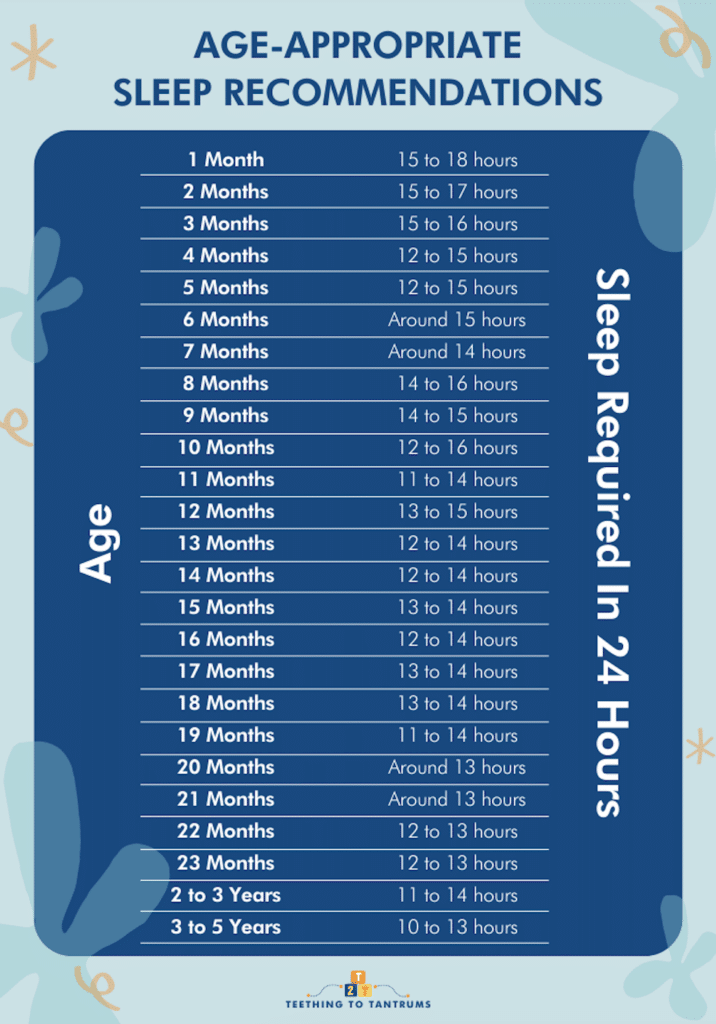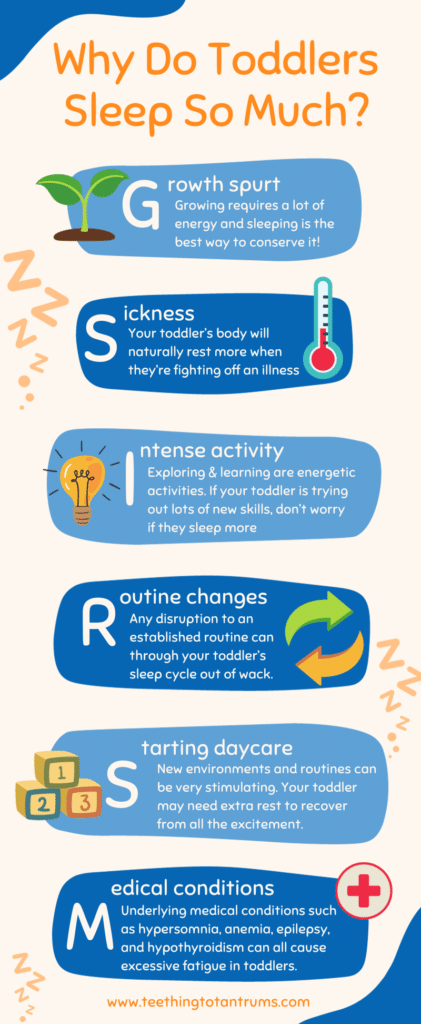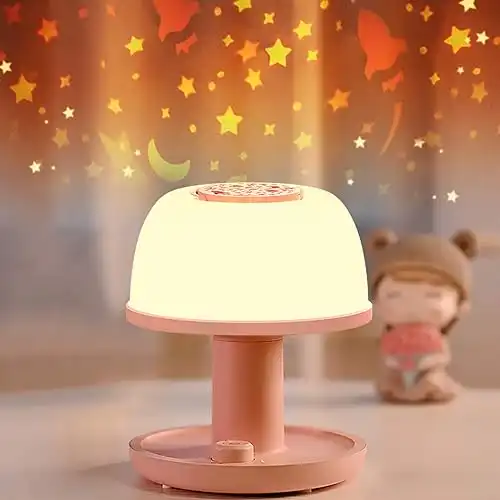If you are parenting a toddler, you will naturally wonder about their sleep needs.
And when your toddler is sleeping too much it can be very alarming for you!
However, do not worry. It’s very normal for toddlers to sleep more… especially if they’re going through a growth spurt or a big change has happened in their life recently.
The issue comes when your toddler is sleeping too much consistently or when accompanied by other sudden changes. When that happens, there are a few things you must do…

Table of Contents
Average Toddler Sleep Requirements (with sleep chart)
First things first. How much sleep do toddlers actually need?
Well, how much sleep your toddler needs in 24 hours will give you a baseline for if they are sleeping too much.
Here’s a quick breakdown of a toddler’s typical daily sleep requirements:

- 1-2 years old: 11-14 hours split over 1 or 2 daytime naps and the rest taken continuously at night
- 3-5 years old: 10-13 hours mostly taken continuously at night with the occasional daytime nap required on busy days.
However, as with adults, it is not just the quantity, but also the quality of sleep that’s important for your little one.
Solid, uninterrupted sleep is crucial for your toddler’s development and health.
Not having an established sleep schedule can also mean that your toddler ends up sleeping too much during the day to make up for lost sleep at night.
Keeping an eye on your toddler’s behavior will also be a good indicator as to whether they are getting enough sleep or not.
If your toddler is energetic and happy during the day, they’re more than likely getting enough sleep. However, if they’re unusually tired or cranky, they may need more sleep.
What Causes A Toddler To Sleep More Than Usual?
If your toddler sleeps too much, it’s usually a result of one of 5 things… A growth spurt, illness, intense activity during the day, changes in routine, starting or returning to daycare. However, if prolonged sleep comes on suddenly and your toddler does not return to their normal sleep patterns within a week, it can be a sign of a more serious medical condition.
All toddlers will go through phases of good and bad sleep.
After 40 years of working with children, I have learned that there are some very common reasons why your toddler will go through a phase of sleeping more than usual.

- Growth Spurts: Your toddler may need more sleep during periods of rapid physical development. These periods require significant energy, and sleep helps to refurbish this energy. It’s not uncommon for your child to sleep longer during these times. If your toddler is eating well and appears healthy, this is often perfectly normal.
- Sickness or Illness: Sometimes, sleeping more can be a sign that your toddler isn’t feeling well. The body naturally demands more rest to fight infections. If they’re experiencing colds, ear infections, or other common illnesses, they might sleep more than usual. Keep an eye on other symptoms to decide if a doctor’s visit is necessary.
- Intense Activity Levels: High levels of physical or mental activity during the day might exhaust your child more. As toddlers explore and learn, their brains can become as tired as their bodies. Getting extra sleep helps them recover and process what they’ve learned. Make sure they’re getting a balance of activity and rest throughout the day.
- Changes In Routine: Any disruption to your toddler’s routine might cause them to sleep more. Travel, family events, or a new sibling arriving can disturb their usual sleeping pattern. As they adjust to the changes, their sleep patterns might temporarily shift. Consistency is key to helping them return to their regular sleep habits.
- Starting Or Attending Daycare: When your toddler first starts attending daycare they may quite naturally become tired as they adjust to the stimulation of their new environment and routine. If your toddler needs to nap for longer or go to bed earlier as they adjust this is quite normal.
- An Underlying Medical Condition: Sometimes your toddler will be sleeping too much because something is not quite right under the surface. Conditions such as hypersomnia, anemia, epilepsy, and hypothyroidism can all cause excessive tiredness and fatigue in toddlers. If your toddler’s sleep patterns do not return to normal after a week, and you suspect your toddler may have an underlying medical condition, speak to your doctor as soon as possible.
Looking to get your little one to sleep quickly and effortlessly? Check out my Bedtime and Nap Cheat Sheet and master the art of making daytime naps and bedtimes as seamless as possible.
A bedtime & nap cheat sheet so good your little one will ask you to put them to bed...
Laura Williams "This is a life saver! I'm so glad I downloaded your bedtime & nap cheat sheet. My little one actually asked me to put him to bed last night! Unbelievable! Thank you so much!"
Click Here For The FREE Cheat Sheet
Signs Of Excessive Sleepiness In Toddlers
As with any age, your toddler’s sleep habits are crucial to their well-being. However, it can sometimes be tricky to figure out what too much sleep for a little one looks like.
Each child is different and while some will need to nap a couple of times during the day…
Others may not want to nap at all and take all their sleep at night and some will do a mixture of the two, depending on their day and what they have been doing.
Signs that your little one’s sleep may not be going as it should are:
- Napping More Often Than Usual
- Trouble Waking in the Morning
- Lack of Energy
- Less Interest in Cooperative Play
- Mood Changes
Remember, look at your child’s sleep patterns over several days rather than a single incident. The odd day of sleepiness or crankiness is normal.

Distinguishing Between Growth Spurts And Hypersomnia
When your toddler is sleeping a lot, you might wonder if it is a growth spurt…
Growth spurts are natural periods when your child’s body grows quickly. During this time, they may sleep more than usual as their body is saving energy to grow.
But if your toddler is sleeping a lot and it doesn’t seem like a growth spurt, it could be hypersomnia…
Hypersomnia is when someone sleeps too much. If your child has it, they’ll still be tired even if they sleep enough.
Look for these signs to tell them apart:
| Growth Spurts | Hypersomnia |
| Growth spurts happen quickly and pass quickly | Sleep doesn’t help your toddler feel rested. |
| Sleep disruptions also come with changes in appetite. | They have trouble waking up. |
| Your toddler seems more hungry. | Daytime naps are long and frequent. |
| They might have a sudden increase in height or weight. | Sleep disruptions continue for a long time without any signs of a growth spurt. |
| Sleep disruption should not require medical attention | A trip to the doctor is advisable to identify whether hypersomnia is triggering the excessive daytime sleepiness. |
How To Help Your Toddler Sleep Better
I am always going on about how if you get sleep right so many other things fall into place when raising young children.
An overtired toddler is never an easy person to handle.
Combine that with the fact that toddlers thrive on routine…
And you can see how important it is to have an established sleep schedule that gives your toddler structure to their day while ensuring they get enough age-appropriate sleep.
The good news is that there are lots of ways to help your toddler sleep better and have a healthy sleep routine that enables them to thrive!
Establish A Consistent Sleep Schedule
The first way to help your toddler sleep better (as always!) is to establish regular naps, bedtimes, and wake-up times for your toddler, even on weekends. This helps to regulate their internal clock, known as the circadian rhythm.
Try to avoid screens as much as possible after dinner and keep activities before bedtime and naps calm and relaxing.
Ensure your toddler’s nap schedule complements their nighttime sleep too. Toddlers typically need 1 to 3 hours of nap time.
However, napping too late in the day or taking too long a nap can affect their nightly rest. Try and aim for a 4-5 hour awake gap between the afternoon nap and bedtime.
If you’re considering visiting a pediatrician, sleep consultant, or behavioral specialist about your toddler sleeping too much, start filling out a sleep diary as soon as possible.
This will help your trusted medical contact get an accurate representation of your toddler’s sleep habits.
There are lots of digital apps you can purchase to keep track of the hours slept, or you can buy a sleep diary, or you can be super frugal and simply write your toddler’s sleeping patterns down on a piece of paper.
With one spacious page dedicated to each day, you'll have plenty of room in this delightful planner to write down all your to-dos, appointments, and notes for the year.
Ideal for parents tracking baby's sleep, feeding, and pooping schedules...
Or a sleep journal for toddlers...
Whatever your requirements for the diary need to be, this handy planner will tick the right boxes.
Create A Bedtime Routine
Follow a calming sequence of activities before bed, like taking a warm bath and reading a bedtime story or two, signals to your child that it’s time to wind down.
This routine should be enjoyable yet soothing, and be finished in 30-45 minutes.
If you’re struggling with bedtime battles with your toddler, you need to check out our Bedtime Battles course.
Fixing bedtime will go a LONG way to helping them get enough nighttime sleep and prevent your toddler from sleeping too much during the day.
Discover How To Create Stress-Free Bedtimes & Peaceful Daytime Naps, Consistently...
Without Tears, Tantrums or Showdowns
✅ Your parenting superpower to unlock calm evenings for years to come! 😌
✅ How to craft a calm and consistent bedtime routine that will get your little one falling in love with sleep… 🛌
✅ Uncover the techniques that the famous “Norland Nannies" use so you can get your little one going to bed and staying there! 🎉
✅ The secret to ending nighttime waking… to ensure your little one is getting enough sleep to thrive and reach their full potential! ❤️
✅ A super simple trick you can use to end hyperactivity before bed … so your little one will happily go to bed when you want them to 🌟
Ensure a Comfortable Sleep Environment
Just like adults, toddlers will have a preference for how they like their room to feel.
If you’re unsure, keep your toddler’s bedroom dark, at the correct temperature, and quiet.
Consider using a night light if your child is afraid of the dark and a white noise machine if they’re light sleepers.
Finding the right night light for your child can be quite a task. You want something safe, comforting, and practical. The Cozy Starry Night Light ticks these boxes, with eye-friendly warm lighting and an easy-to-use dimmer.
Its gentle glow makes it the best night light for feeding baby, diaper changes, or comforting your little one back to sleep.
As your baby grows the Cozy Starry Night Light's starry sky projection can provide comfort and gentle quiet time stimulation. Its soft lighting ensures a dreamy, peaceful environment, supporting your baby’s natural sleep cycle.
It really is a fantastic nightlight (at a very reasonable price!)
- Eye-friendly warm lighting with adjustable brightness.
- Includes a timer function for convenience.
- Projects a starry sky that is soothing for little ones.
- Rechargeable battery, so it's very portable.
- A USB adapter is not included for charging.
- The star projector is static without motion (however, this is ideal for very young babies and toddlers).
- Battery life varies based on the brightness settings.
Remember that a comfortable sleep environment can definitely improve the quality of your child’s sleep too so make sure their bed and pajamas are cozy and comfy as well.
Limit Screen Time Before Bed
As I briefly mentioned earlier, screens are the enemy of your bedtime routine. The blue light from screens can interfere with the production of melatonin, the sleep hormone, making it hard for your toddler to wind down for sleep.
Turn off TVs, tablets, and other electronics at least an hour before bedtime (including yours) to help your toddler’s mind relax and prepare for rest.
Monitor Diet and Activity Levels
You’d be amazed by how much sleep is affected by your child’s diet. Meals heavy in complex carbohydrates can make your toddler feel lethargic as it uses a lot of energy to digest…
Alternatively, foods high in simple sugars will spike your toddler’s blood sugar triggering hyperactivity…Shortly followed by a sugar crash (which can mean your toddler sleeps too much because their sleep routine is out of whack).
Ensure your toddler has a balanced diet and avoid large meals close to bedtime.
Also, make sure they get enough physical activity during the day to burn off extra energy and practice new skills. A good diet and regular exercise will promote restful sleep and balance your toddler’s circadian rhythm.
Utilise Quiet Time
Quiet time is one of my all-time favorite parenting techniques.
Not only is it great to help overstimulated toddlers calm down… But if your toddler is nap transitioning or does not like to nap during the day, quiet time after lunch provides the ideal pressure-free opportunity for your toddler to rest and reset.
(It also gives you the chance to get some odd jobs done too.)
In my experience, most toddlers cannot keep going all day without any downtime.
So by having quiet time, you allow your toddler the time to recharge their batteries before getting on with the rest of their day. You may even find that on busy days your toddler will fall asleep during quiet time by themselves.
When To See A Doctor About A Toddler Sleeping Too Much
If your toddler is sleeping too much after a week and you’ve tried all the tips I’ve outlined above with limited success, speak to your pediatrician sooner rather than later for peace of mind.
Here are some other signs you must contact your doctor as soon as possible:
- Your toddler is sleeping over 14 hours a day regularly. This much sleep for over a week could indicate an underlying health issue.
- Your toddler is difficult to wake up from naps or nighttime sleep. Excessive sleepiness and being hard to rouse is not normal and should be evaluated.
- The excessive sleepiness comes on suddenly and is a clear departure from your child’s normal sleeping patterns. Sudden changes often need medical attention. Especially if you notice other worrying symptoms along with increased sleep, like loss of appetite, weight loss, lethargy or irritability when awake, fever, etc.
- If your toddler starts snoring very loudly, gasping for air, or stopping breathing briefly while asleep, see your doctor or a sleep medicine specialist. These could be signs of sleep apnea.
- If excessive sleeping is interfering with your child meeting developmental milestones or if they have difficulties with balance or muscle control, talk to your doctor as soon as you can to rule out underlying issues.
Finally, if you’re just generally concerned about your toddler’s sleep patterns, trust your gut and let your pediatrician know.
They can help determine if your toddler’s sleep habits are normal or related to a medical issue needing treatment. And sometimes, it’s better to be safe than sorry.
Frequently Asked Questions About Toddlers Who Sleep Too Much
When you notice your toddler sleeping more than usual, it’s natural to have questions. Here’s what you need to know.
Q: Could excessive sleep signify illness in a toddler?
A: Yes. Excessive sleep in a toddler could indicate illness. If they’re sleeping more than normal, it may be time to check for other symptoms such as an ear infection or a cold.
Q: How can illness affect a toddler’s sleeping patterns?
A: Illness might disrupt a toddler’s sleep routine, causing them to sleep more or less than usual, depending on the illness and its severity. Your toddler will likely sleep more during the day and want more comfort at night, especially if they wake from discomfort.
Q: What should I do if my toddler is sleeping for more than the recommended hours for their age?
A: If your toddler exceeds the typical 11-14 hours of sleep for their age for over a week and or you observe changes in their behavior, consult your pediatrician.
Q: Is it normal for a toddler’s appetite to decrease when they are sleeping excessively?
A: A decrease in appetite can accompany increased sleep if your toddler isn’t feeling well. Monitor their eating habits alongside their sleep patterns. If there is no improvement, or your toddler is losing weight quickly, contact your pediatrician.
Q: When should I be concerned about my toddler’s increased need for sleep?
A: You should be concerned if there’s a sudden increase in toddler sleep with other signs like fever, lethargy, or irritability. Otherwise, an increase in sleep is usually a passing phase that is accompanied by a growth spurt.
Q: Why is my toddler snoring a lot?
A: Frequent snoring can suggest breathing difficulties like sleep apnea. It’s important to consult your pediatrician, especially if snoring is loud and persistent, or your toddler sounds like they’re gasping for air.
Q: Is my toddler sleeping too much because of a sleep regression?
A: A sleep regression can disrupt nighttime sleep, leading to more daytime sleeping. Check if recent milestones or changes in routine could be the cause. And always take a look at how much sleep your toddler is having in 24 hour period to ascertain whether their sleepiness is excessive or just a way of making up for lost sleep either at night or during the day.
Need More Parenting Help?
- Download our FREE Perfect Sleep Cheat Sheet. It’s a free, easy-to-use and proven formula designed for parents of 0-5 year olds to master the art of consistently undisturbed and restful sleep without the yelling, nagging or exhausting long-winded evenings.
- Check out our Parenting Toolbox. You’ll get access to expertly-chosen products that you can guarantee are the best for your little one and your wallet.
- Ready to create the calm, peaceful evenings you deserve? Then checkout our most popular course - The Bedtime Battles Masterclass

A bedtime & nap cheat sheet so good your little one will ask you to put them to bed...
Laura Williams "This is a life saver! I'm so glad I downloaded your bedtime & nap cheat sheet. My little one actually asked me to put him to bed last night! Unbelievable! Thank you so much!"
Click Here For The FREE Cheat Sheet





